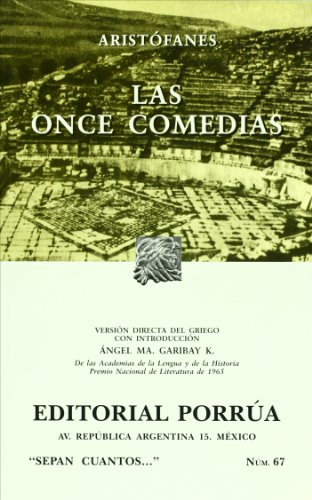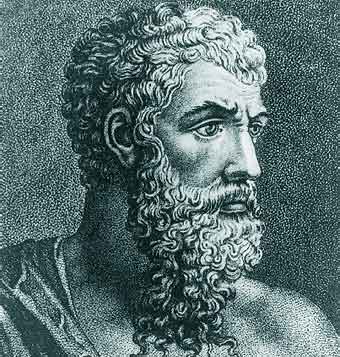THE WASPS BY ARISTOPHANES.
The Wasps By Aristophanes.
Oscar Rodolfo Velázquez.

Questions about the author:
- ¿Which kind of author lies upon The wasps?
- An author that is a critic of the people in the goberment of his time and for that reason he made a review of them through a comedy to to ridicule them. A comedian.
- ¿Did he have in mind any reader?
- The greeks in the moment of the published comedy. All the people for the deep and timeless meaning.
- ¿Did he set a specific contract on it?
- Yes, the author believe of the critic spirit of the reader.

Questions about Sources:
- ¿Is History the real and direct source?
- Yes, because it represents the politics on that time.
- ¿How far personal affairs influence the Plot?
- There is a misterious, but probably, he could reflect his critics in Bdylocleon.
- ¿Is this a theater-play about Justice?
- The politican novel Animal Farm and the movie Catch me if you can.
- ¿Why talking and writing about Justice through comedy?
- Because he satirizes her through humor, which is a fine mockery of the abuses that people in power can commit.
- ¿Is a love-hate relation between father and son? or
- ¿Is a justice-injustice one?
- It is a relation with love principally, but also, it has hate.
- ¿How worth is Justice in greek society?
- The theory of democracy is good, but in the practice in was a benefit for the gobernments.

Questions about structure:
- ¿Is that kind of comedy structure made for play performance?
- Yes.
- ¿How facts are put to deal kindly with argument and mise-en-scene?
- With only a few changes of escenaries.
Questions about Plot:
As a contemporary reader:
- ¿Can I find an example of Aristohane’s comedy in current Comedy?
- Yes, because the irony is used in comedies that critize the politics.
- ¿How important is irony since then?
- It´s central for it´s capacity to do an objective critic.
- ¿Should I consider Aristohane’s comedy a fixed model?
- Yes, becuse it was the new model of the comedy.
As an author:
- ¿Aristhophanes can it make rise atention in contemporary audience?
- Yes, because it talks about a universal topic.
- ¿Coul it be modified to get expectations of contemporary audience?
- Yes, some expressions and objects of the modern context.
- It could have some Little modifications of the context.
- Yes, like phrases and objects.
Questions about Action:
- ¿Did author have another choice to write down his ideas on Plot?
- The irony was an effective way to crititic the politic of his time.
- ¿Is climax a paradigm to be broken?
- Yes, because it would appear in different moments.
- ¿How should climatic points be understood from the reader’s view?
- Like the circunstsnces of tension in the story.
Questions about Time:
- ¿Is there any Narrative Technique I/You can identify for time developing?
- Start talking in present the memories of the past.
- ¿Why to use that kind in his work, by Aristophanes?
- To give some context to the reader and explain it.
Questions about Space:
- ¿Does Athens represent the whole Greece?
- Not, but an important cultural part.
- ¿Might Aristophanes foreshadow the present world?
- Yes, in a story that talks about universal valoues.
- ¿May we have a glance of the ancient Greece through The wasps?
- Yes, because the story was written in that time.
Questions about Narrator:
- ¿What kind of narrator is the Chorus?
- Witness outside the scene.
- ¿Why did Chorus dissapeared in Theater plays?
- Because it doesn´t participate in the action.
Questions about Characters:
- ¿What kind of character is the protagonist?
- Bad, the father.
- ¿What kind of character is the principals?
- The contradictory personalities of the father Filocleon and his son Bdylocleon.
- ¿What kind of character is the antagonist?
- Bad, the wasps.
Questions about Expression forms:
- ¿How dialogues are performed?
- Between characters and the wasps.
- ¿Do dialogues truly belong to the character which realize them?
- Yes.
Questions about Ideas:
- ¿Which kind of idea shows the highest level among them?
- The idea of the manipulating people on the politic.
- ¿Why has the author done it so?
- Because he want to express the liberty that needs all people, in the especific case of the story, the father.
- ¿What kind of thinking is for expressing ideas?
- Introspection.
- ¿How characters counciousness is made out in the drama?
- With the experience and the necesisity of have a better quality of life.
Questions about symbols:
- ¿What does represent father?
- Blindness.
- ¿What does represent son?
- Prudence.
- ¿What does represent dogs?
- The irrationality.
Questions about Meaning of the work:
- ¿Is The wasps important as classical Literature work?
- Yes, because his treatment of the necesity of have good politicians is basic.
- ¿Is It worth of universal recognition? ¿Why?
- It has universal recognition because it represnt universal values.
Questions about Reception of the work:
- ¿How different was meaning in his age and today’s?
- It´s vaery similar. Only different kinds of have personal benefits from politic.
- ¿Are you shocked with Aristophanes world?
- More less. Definitely, it has a frontal critic.
- ¿Are remaining values from the past in our present world?
- Yes, because they are timeless.
References:
- Aristófanes (2006). "Las avispas", en el libro "Las once comedias". Editorial Porrúa, colección "Sepan cuántos": México, versión de Ángel Ma. Garibay (368 pp).
- Roldán, B. (2018). Apuntes de la clase de "Cultura literaria". Universidad Panamericana: Guadalajara.
Links:
- "Las avispas" puesta en escena de 1966, disponible en:
https://www.youtube.com/watch?v=gFUQ-yV5nnI
- Resumen de "Las avispas" disponible en:
https://www.youtube.com/watch?v=RiQEVyNvAvE
- Aristófanes (2006). "Las avispas", en el libro "Las once comedias". Editorial Porrúa, colección "Sepan cuántos": México, versión de Ángel Ma. Garibay (368 pp).
- Roldán, B. (2018). Apuntes de la clase de "Cultura literaria". Universidad Panamericana: Guadalajara.
Links:
- "Las avispas" puesta en escena de 1966, disponible en:
https://www.youtube.com/watch?v=gFUQ-yV5nnI
- Resumen de "Las avispas" disponible en:
https://www.youtube.com/watch?v=RiQEVyNvAvE
Comentarios
Publicar un comentario